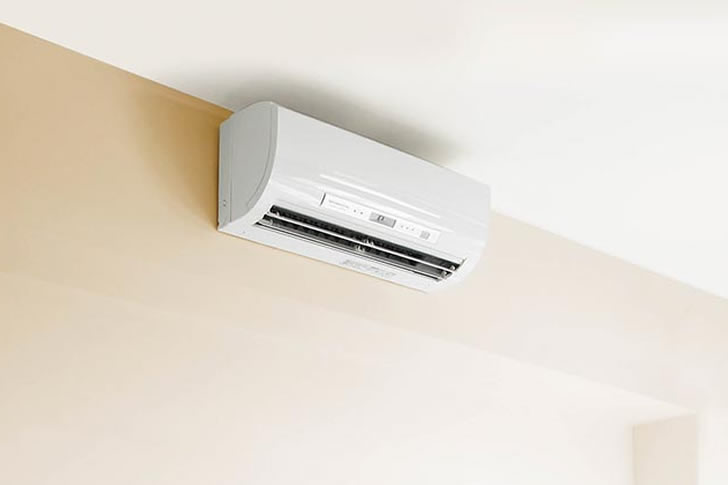Ductless Air Conditioning: Efficient and Convenient
Ductless air conditioners offer an efficient and flexible way to cool your home. Unlike traditional systems, they don’t require ductwork, making them a popular choice for many homeowners.

What is a Ductless Air Conditioner?
A ductless air conditioner, also known as a mini-split system, consists of an outdoor unit and one or more indoor units. These systems are designed to provide targeted cooling to specific areas without the need for ductwork.
Key Benefits of Ductless Air Conditioners
- Energy Efficiency Ductless systems are highly efficient, often using less energy than traditional air conditioning systems. They allow for targeted cooling, reducing wasted energy in unoccupied rooms.
- Flexible Installation These units can be installed in various configurations, making them ideal for homes without existing ductwork or those with specific cooling needs in certain areas.
- Improved Air Quality Without ducts, there’s less opportunity for dust and allergens to circulate through your home, leading to cleaner, healthier indoor air.
- Zone Cooling Each indoor unit operates independently, allowing you to customize the temperature in different rooms or zones according to individual preferences.
- Quiet Operation Ductless systems are known for their quiet performance, making them perfect for bedrooms, living rooms, and other areas where noise might be a concern.
- Cost Savings Due to their efficiency and targeted cooling capabilities, ductless systems can lower energy bills. Additionally, the installation costs are often lower because they don’t require extensive ductwork.
- Compact and Discreet Design The sleek, compact design of ductless units means they take up less space and can be installed high on walls or in other unobtrusive locations.
- Easy Maintenance Ductless systems typically require less maintenance compared to traditional units. Filters are easy to access and clean, and there’s no ductwork to inspect or clean.
- Versatility These systems are versatile enough to be used in a variety of settings, from single rooms to entire homes, and are also suitable for commercial spaces.
- Environmentally Friendly Many ductless systems use environmentally friendly refrigerants and have lower energy consumption, contributing to reduced greenhouse gas emissions.
Chart: Examples of Ductless Air Conditioners and Their Features
| Model | Price Range | Cooling Capacity | SEER Rating | Noise Level | Number of Zones | Warranty |
|---|---|---|---|---|---|---|
| Mitsubishi MUZ-GL12NA | $1,200 – $1,500 | 12,000 BTU | 23 SEER | 19 dB | Single Zone | 5 years |
| Fujitsu Halcyon | $1,500 – $2,000 | 18,000 BTU | 22 SEER | 20 dB | Single Zone | 5 years |
| LG LMU36CHV | $2,500 – $3,000 | 36,000 BTU | 20 SEER | 29 dB | Multi-Zone | 10 years |
| Daikin 17 Series | $1,300 – $1,800 | 24,000 BTU | 17 SEER | 28 dB | Single Zone | 5 years |
| Panasonic Mini-Split | $1,700 – $2,200 | 30,000 BTU | 19 SEER | 25 dB | Multi-Zone | 7 years |
| Gree Sapphire | $1,400 – $1,900 | 12,000 BTU | 21 SEER | 19 dB | Single Zone | 5 years |
| Senville SENL-09CD | $800 – $1,200 | 9,000 BTU | 19 SEER | 21 dB | Single Zone | 2 years |
| Carrier Infinity | $3,000 – $4,000 | 36,000 BTU | 30 SEER | 28 dB | Multi-Zone | 10 years |
| Toshiba Mirai | $1,200 – $1,600 | 24,000 BTU | 18 SEER | 26 dB | Single Zone | 7 years |
| Pioneer WYS012-17 | $1,000 – $1,400 | 12,000 BTU | 17 SEER | 22 dB | Single Zone | 5 years |
Q&A Section
Q1: How does a ductless air conditioner work? A1: A ductless system consists of an outdoor unit connected to one or more indoor units by refrigerant lines. The indoor units cool individual rooms or zones directly, eliminating the need for ductwork.
Q2: Can ductless air conditioners be used for heating as well? A2: Yes, many ductless systems are equipped with heat pumps, allowing them to provide both cooling and heating. This makes them a versatile option for year-round comfort.
Q3: Are ductless air conditioners more expensive to install than traditional systems? A3: While the initial cost may be higher, ductless systems often have lower installation costs due to the lack of ductwork. They also offer long-term savings through improved energy efficiency.
Q4: How do I choose the right size ductless system for my home? A4: The right size depends on the area you need to cool and heat. A professional can perform a load calculation to determine the appropriate capacity for your space.
Q5: What maintenance does a ductless air conditioner require? A5: Regular maintenance includes cleaning or replacing filters, checking refrigerant levels, and ensuring that the outdoor unit is clear of debris. Professional servicing is recommended annually.
Conclusion
Ductless air conditioners offer numerous benefits, from energy efficiency and flexible installation to improved air quality and cost savings. They are a versatile solution for cooling and heating homes of all sizes. Whether you’re looking to upgrade your current system or seeking a new installation, considering a ductless air conditioner could be a smart move for your home comfort and energy efficiency.
References







Recent Comments